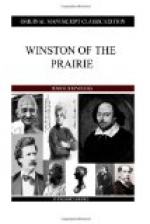He stopped again, and once more there was a soft rustle of dresses, and a murmur, as those who listened gave inarticulate expression to their feelings. Moving a little, he looked steadily at Maud Barrington and her aunt, who sat close together.
“Then,” he said, very slowly, “it was borne in upon me that I could not persist in deceiving you. Courthorne, I fancied, could not return to trouble me, but the confidence that little by little you placed in me rendered it out of the question. Still, I saw that I could save some at least at Silverdale from drifting to disaster, and there was work for me here which would go a little way in reparation, and now that it is done I was about to bid you good-by, and ask you not to think too hardly of me.”
There was a moment’s intense silence until once more Dane rose up, and pointed to Courthorne sitting with half-closed eyes, dusty, partly dazed by indulgence, and with the stamp of dissolute living on him, in his chair. Then he glanced at Winston’s bronzed face, which showed quietly resolute at the bottom of the table.
“Whatever we would spare you and ourselves, sir, we must face the truth,” he said. “Which of these men was needed at Silverdale?”
Again the murmurs rose up, but Winston sat silent, his pulses throbbing with a curious exultation. He had seen the color creep into Maud Barrington’s face, and her aunt’s eyes, when he told her what had prompted him to leave Silverdale, and knew they understood him. Then, in the stillness that followed, the drumming of hoofs rose from the prairie. It grew louder, and when another sound became audible too, more than one of those who listened recognized the jingle of accoutrements. Courthorne rose unsteadily, and made for the door.
“I think,” he said, with a curious laugh, “I must be going. I don’t know whether the troopers want me or your comrade.”
A lad sprang to his feet, and as he ran to the door called “Stop him!”
In another moment Dane had caught his arm, and his voice rang through the confusion as everybody turned or rose.
“Keep back all of you,” he said. “Let him go!”
Courthorne was outside by this time, and only those who reached the door before Dane closed it heard a faint beat of hoofs as somebody rode quietly away beneath the bluff, while as the rest clustered together, wondering, a minute or two later, Corporal Payne, flecked with spume and covered with dust, came in. He raised his hand in salutation to Colonel Barrington, who sat very grim in face in his chair at the head of the table.
“I’m sorry, sir, but it’s my duty to apprehend Lance Courthorne,” he said.
“You have a warrant?” asked Barrington.
“Yes, sir,” said the corporal.
There was intense silence for a moment. Then the Colonel’s voice broke through it very quietly.
“He is not here,” he said.
Payne made a little deprecatory gesture. “We know he came here. It is my duty to warn you that proceedings will be taken against any one concealing or harboring him.”




